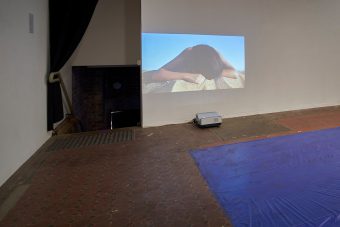This is part of a series of ekphrastic poems presented alongside ‘Hyphenated’ at The Substation. ‘Even Now’ responds to Nikki Lam’s ‘Falling Lead Returns to its Roots’.

Even Now
[for Mindy Gill]
Even now as you lie on your stomach,
reading of the mad king, desiring me, I want
to say all this happened a long time ago,
long ago this room, the call of kites
and crows, the food we share each morning,
unvarying and satisfying, I want to say
last night I dreamed my father refused
to die, he shuffled from room to room
forgetting why, so when you offer me your lips,
I want to say I love you even as I turn away,
even as I walk out of the house to the street
and a woman who bows to her phone, whose
bewilderment grows each time I speak.
About the Artwork
Falling Leaf Returns to Its Roots
2014
HD Video
Falling Leaf Returns to Its Roots 落葉歸根 is a Chinese analogy of life adapted to the becoming of, questionably, Australian. A response to Max Dupain’s Sunbaker (1937), the work questions the enduring and absurd process of becoming through the lens of migration. The Chinese analogy is often used to describe a person who leaves home to experience life, who will always return by the end of their journey, in order to fulfil the circle of life, through death or reconnections with their family, their heritage and their roots. Through this process of returning, it is essential for one to let go of personal ventures in order to fulfil a collective, greater goal, one that is not only bounded by its cultural context, but the ecology of life, of nature, to belong.
Applying this analogy to the shifting grounds of Australia conjures a conflicting sense of unbelonging, where its history of dispossession continues to be the counterpoint to the concept of a, singular, Australian identity.
About the Artist
Nikki Lam is a visual artist and curator based in Melbourne, Australia. From video and installation, to writing and performance, Nikki’s practice engages in the complexity of belonging through the exploration of self, memory and space. She is interested in exploring the translations of post-colonial identities and narratives in the hybrid world, often through the studies of rituals, language and their visual representations. Working primarily with the moving image, she is also passionate about the cross-sections of screen cultures, media arts and representations of narratives and histories.

